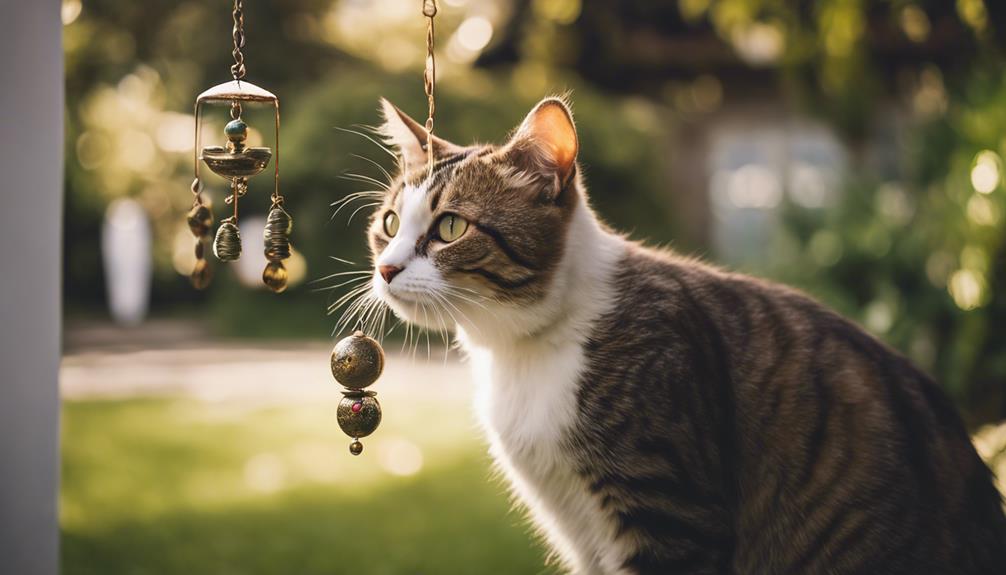Are Cats Scared of Wind Chimes
Have you ever noticed your cat's mysterious reaction to wind chimes? These curious creatures can display a mix of fascination and caution towards the gentle tinkling sounds.
But what makes some cats shy away from these melodic ornaments? Let's unravel the intriguing bond between cats and wind chimes, exploring why these musical decorations can stir up such varied responses in our feline friends.
Join us on this journey to uncover the secrets behind your cat's behavior and discover the enchanting world of cat psychology.
Impact of Wind Chimes on Cats
Have you ever noticed how cats are drawn to the gentle sounds and movements of wind chimes? Cats find wind chimes fascinating because they provide both auditory and visual stimulation. These charming decorations can capture a cat's curiosity and offer them entertainment.
When introducing wind chimes to your furry friend, keep an eye on how they react, especially if they're sensitive to loud noises. Wind chimes can make your cat more playful and enrich their environment. By safely hanging wind chimes, you can add a fun and whimsical touch to your cat's space.
Signs of Fear in Cats

If your cat is scared of wind chimes, watch out for signs like hiding, trembling, or excessive grooming. Cats may also avoid wind chimes altogether if they find them alarming.
Dilated pupils, flattened ears, and a crouched posture are clear indicators of your feline friend's fear.
Fearful Cat Behaviors
Hey there!
Have you ever noticed your cat acting a bit scared or anxious? Keep an eye out for subtle signs like hiding, trembling, or big pupils, as these are common indicators of fear in cats.
Cats who spend time outdoors might show fearful behaviors because of different things around them. If your cat is scared, they might try to avoid things, hiss or growl, or change their body language like flattening their ears or arching their back.
Other signs of fear could be excessive grooming, meowing a lot, or swatting when approached. Recognizing these behaviors can help you support your cat and make them feel safe and comfy in their surroundings.
Handling Scared Cats
Hey there! So, when a cat is scared or anxious, they might hide, tremble, or have dilated pupils. It's important to know these signs so you can help them feel safe.
Here are some tips for handling scared cats:
- Create Safe Spaces: Cats feel better when they've places to hide or climb up high.
- Avoid Eye Contact: Cats find direct eye contact intimidating, so stay calm and don't stare at them.
- Speak Softly: Use gentle and reassuring tones to comfort the cat.
- Move Slowly: Quick movements can make a scared cat even more frightened.
- Offer Treats: Giving them treats can help them feel more secure and build trust with you.
Remember these tips to help scared cats feel more at ease!
Cats' Auditory Sensitivity

Cats' auditory sensitivity is remarkable, allowing them to perceive sounds at frequencies far beyond what humans can detect.
This heightened ability makes loud or high-pitched noises, like wind chimes, particularly unsettling for our feline friends.
Understanding how these sounds impact your cat can help you create a more peaceful environment for them at home.
Cat Hearing Range
Hey there! Ever wondered about cats' amazing hearing abilities? Well, cats have a super wide range of hearing, from 45 Hz to 64 kHz! That's way beyond what us humans can hear. Here are some cool facts about cats' hearing:
- Cats can hear really high-pitched sounds that we can't even imagine.
- Their ears can rotate a full 180 degrees to pinpoint where a sound is coming from.
- Cats can hear ultrasonic frequencies, which help them talk to other cats and catch tiny movements.
- Their sharp hearing helps them find prey or danger just by listening.
But, be careful! Loud noises can stress out our feline friends because of their sensitive ears. So, keep it quiet around your cat!
Wind Chime Sound
Hey there! Ever wonder why your cat reacts so strongly to wind chime sounds?
Well, it's all about their super sensitive hearing! Cats have ears that can pick up on even the slightest noises, like those high-pitched tones from wind chimes. These sounds can catch them off guard and make them feel a bit uneasy.
Because of this, some cats might get scared or try to avoid the noise altogether. It's important to pay attention to how your cat reacts and make sure they feel safe and comfortable at home.
Factors Influencing Reactions

Hey there! Have you ever wondered why your cat reacts a certain way to wind chimes?
Well, it all boils down to a few key factors. Each cat has its own unique personality and past experiences, which can influence how they feel about wind chimes. Some cats might find the sounds soothing or interesting, while others may not be fans.
The volume, pitch, and intensity of the chimes can also play a role in how your cat perceives them. If your cat is sensitive to noise or has anxiety, their reaction may be different.
Soothing Effects on Felines

Hey there!
Have you ever noticed how wind chimes can have a calming effect on cats? It's pretty cool! The gentle sounds and movements of wind chimes can actually soothe our feline friends.
Cats, being naturally curious, are intrigued by the soft melodies and vibrations of wind chimes. The way the chimes move and make noise is like a fun game for them! Cats have super sharp hearing, so they love listening to the delicate sounds for hours on end.
Wind chimes create a peaceful atmosphere for cats, encouraging them to explore and play. So, if you see your cat mesmerized by the sounds of wind chimes, know that they're probably having a really relaxing and enjoyable time. Pretty neat, right?
Managing Cat Anxiety Around Chimes

Hey there! If your cat gets anxious around wind chimes, creating a calming environment can really help. Here are some tips to manage your cat's anxiety:
- Make sure your cat has safe hiding spots to go to when they feel anxious.
- Use pheromone diffusers or calming sprays to create a relaxing atmosphere.
- Play soft music or white noise to cover up the sound of the wind chimes.
- Stick to a routine to help your cat feel more secure and know what to expect.
- Offer treats or toys as distractions on windy days when the chimes are active.
Training Techniques for Desensitization

Hey there! If your cat gets jittery around wind chimes, don't worry, we've got a trick to help them chill out. It's called desensitization training, and it's all about getting your cat used to the sound slowly.
Start by playing low-volume wind chime sounds for short periods, so it's not too much for your furry friend. When your cat stays calm, give them treats or playtime to show them it's all good. Keep an eye out for any signs of stress during these sessions.
Conclusion and Tips for Cat Owners

Hey there, cat lovers! Thinking about adding some wind chimes to your feline friend's world? It can be a total game-changer! Wind chimes bring fun and excitement to your cat, making their environment more engaging. Here are some tips to help you make the most of this new addition:
- Watch how your cat reacts to the wind chimes and adjust them for safety and comfort.
- Put the wind chimes in spots where your cat hangs out the most for maximum enjoyment.
- Choose wind chimes with soft sounds and calming tones to keep your cat intrigued.
- Make sure the wind chimes are securely hung to avoid any accidents.
- Switch up the wind chimes regularly to keep your cat entertained.
Give it a try and watch your kitty's face light up with joy!
Frequently Asked Questions
Are Cats Afraid of Wind Chimes?
Cats have varied reactions to wind chimes. Some may find the sounds soothing while others might be startled. Consider your cat's preferences as the tinkling noises can be intriguing. Observe their behavior for comfort.
What Sounds Keep Cats Away?
To keep cats away, avoid using ultrasonic repellers, motion-detected sprinklers, and citrus peels. Opt for lavender, rosemary, or lemon thyme plants. Dog fur, rubber snakes, or chicken wire can also deter them. Understanding their sensitivities helps create a cat-friendly environment.
Is There a Scent That Repels Cats?
To repel cats, try scents like lavender, rosemary, or citronella. These strong aromas are disliked by cats due to their sensitive noses. Use deterrent sprays with essential oils, like lemon thyme or geranium, for a natural way to keep cats away.
What Is the Best Deterrent for Cats in Your Garden?
To keep cats out of your garden, use lavender, rosemary, or citronella plants as deterrents. Motion-detected sprinklers and ultrasonic repellers work well. Create barriers with wood chips, pine cones, or citrus peels. Use garden bed covers or DIY sprays for effective results.
Conclusion
To sum up, most cats aren't scared of wind chimes. They actually find the sounds and vibrations fascinating, sparking their curiosity and hunting instincts.
If your cat seems afraid of wind chimes, try desensitization training and create a calming environment for them. Remember, each cat is different, so observe their reactions and adjust accordingly for a happy, stress-free kitty.
Have you noticed your cat's reaction to wind chimes? Share your experiences with us!

